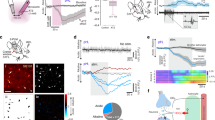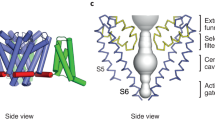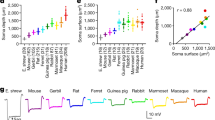Abstract
ACCORDING to Hodgkin and Katz1, in the complete absence of sodium ions from the surrounding medium, the action potential of the giant axon of the squid is diminished, whereas its resting potential is not changed at all. This observation of the effect of sodium ions on the electrical activity of nerve fibre is one of the bases of the sodium theory of nerve activity of the Cambridge school. So the metabolic effect of sodium-free medium on brain slices has been studied2, with special emphasis on its relation to the functioning of nerve cells in general, because the metabolic activity of nerve fibres is difficult to measure.
This is a preview of subscription content, access via your institution
Access options
Subscribe to this journal
Receive 51 print issues and online access
$199.00 per year
only $3.90 per issue
Buy this article
- Purchase on Springer Link
- Instant access to full article PDF
Prices may be subject to local taxes which are calculated during checkout
Similar content being viewed by others
References
Hodgkin, A. L., and Katz, B., J. Physiol., 108, 37 (1949).
Gore, M. B. R., and McIlwain, H., J. Physiol., 117, 471 (1952). Tsukada, Y., and Takagaki, G., Nature, 175, 725 (1955).
Takagaki, G., Hirano, S. and Tsukada, Y., Arch. Biochem. Biophys., [68, 196 (1957)].
Author information
Authors and Affiliations
Rights and permissions
About this article
Cite this article
TAKAGAKI, G., TSUKADA, Y. Sodium Ions and Tissue Metabolism: Some Metabolic Peculiarities of Brain Tissue. Nature 180, 707–708 (1957). https://doi.org/10.1038/180707a0
Issue Date:
DOI: https://doi.org/10.1038/180707a0
Comments
By submitting a comment you agree to abide by our Terms and Community Guidelines. If you find something abusive or that does not comply with our terms or guidelines please flag it as inappropriate.



